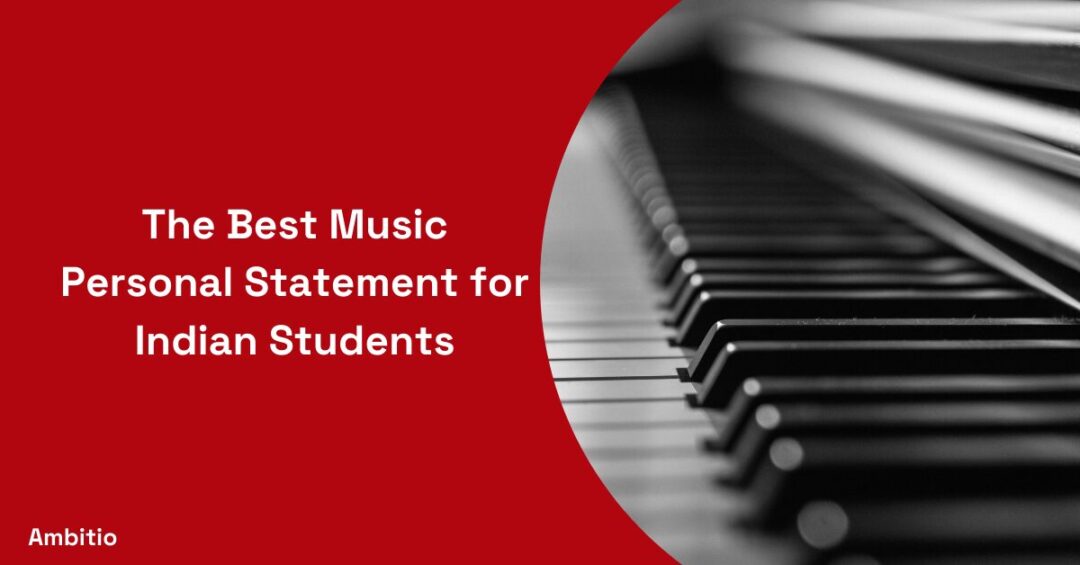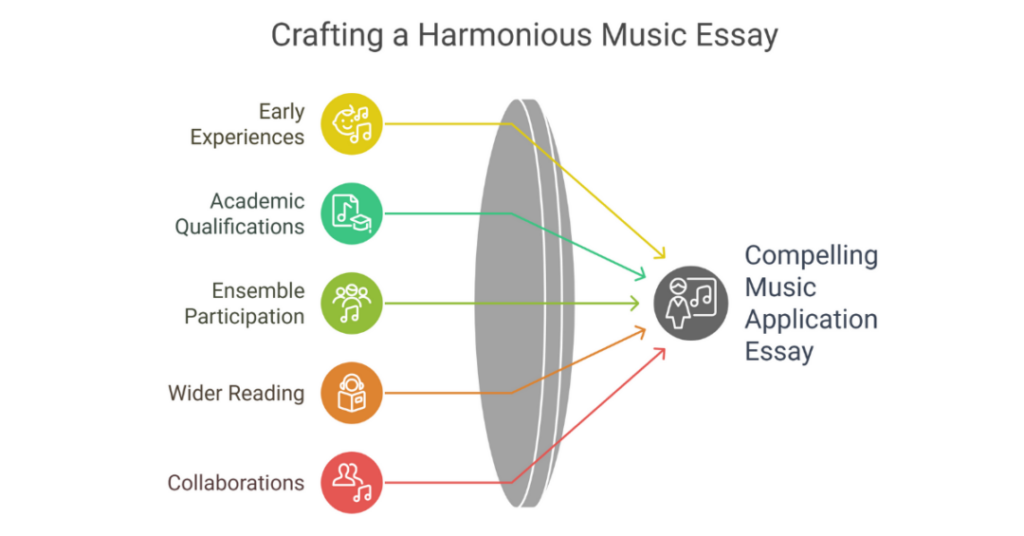15 May 2025
6 minutes read
The Best Music Personal Statement for Indian Students

Key Takeaways
- Music personal statement highlights your passion, academic interests, and musical journey to impress top UK university admissions tutors.
- Music personal statement must showcase your achievements, ensemble experience, and understanding of music theory and context.
- Music personal statement helps convey motivation, suitability for music courses, and your aspiration to study music at renowned institutions.
Music is more than just the notes and rhythm; it’s more than culture, more than passion, and more than aspiration for a lot of Indian students. It’s not enough to write down a checklist on a music personal statement for top UK universities; it’s showcasing identity and purpose.
A world-class personal statement can set one applicant apart amidst a very competitive academic landscape.
No matter how your musical journey started with Bollywood tunes or Carnatic ragas, taking across those roots to aspirations of Oxford and Cambridge or other premier colleges can turn your story into legend.
Here is the step-by-step recipe to penning a great personal statement that elicits the best out of your talent, curiosity, and intellectual passion for music.
Why is a Music Personal Statement Important?
Interesting fact: Mozart wrote his first symphony at the age of eight—some pupils begin that early! But even talent requires context, and that’s when a good personal statement comes in handy.
It enables the admissions tutors to look past your grades and gain an insight into your musical psyche.

This is what a good music personal statement does:
- Reflects your motivation and love of music
- Demonstrates your understanding of music and its context
- Shows your academic interests and curiosity in the field
- Highlights examples of your musical experiences and achievements
- Displays your suitability for the university’s music programme
Comparison: Application With vs. Without a Strong Personal Statement:
| Criteria | With Strong Statement | Without Strong Statement |
|---|---|---|
| Musical Identity | Clear and unique | Unclear or generic |
| Academic Interest | Well-articulated | Vague or missing |
| Understanding of Music | In-depth and insightful | Superficial |
| Engagement with the Subject | Shows exploration and extra-curricular effort | Minimal |
| Admissions Tutor Impression | Positive and memorable | Easily overlooked |
What to Include in Your Music Application Essay?
Fun fact: The SAT once had a question that referenced Bob Dylan lyrics. Music truly finds its way everywhere. Your music application essay is your space to hit the right notes with storytelling, evidence, and aspiration.
Key components to include:
- Your early experiences and how they sparked your interest in music
- Academic qualifications, grades, and achievements in music courses
- Ensemble participation, instrument proficiency, or music technology use
- Wider reading or independent research in music history, psychology, or ethnomusicology
- Collaborations, concerts, competitions, or teaching experiences

Academic vs. Performance Focus:
| Focus Area | Strengths | Performance Highlights |
| Theory Knowledge | Composition, music history, analysis | Real-time interpretation and expression |
| Coursework | Research essays, analytical writing | Practical exam scores |
| Projects | Recording and music technology | Recitals, concerts, ensemble contributions |
| Skills | Analytical, critical thinking | Expression, teamwork, stage presence |
| Evaluation | Understanding of context, wider reading | Execution, creativity, audience engagement |
How to Impress Admission Tutors With Your Personal Statement?
Fun fact: The average orchestra uses more than 80 musicians at once. Just like a conductor makes sense of all the instruments, your personal statement must orchestrate your ideas into a coherent performance.
Here are tips to dazzle music tutors:
- Start with a hook that conveys your enthusiasm and ambition
- Highlight achievements and grades to demonstrate educational excellence
- Connect your experience with instruments like piano improvisation
- Talk about exploring music courses like ethnomusicology or music technology
- Mention your wider reading, from classical theory to contemporary composition
Recommended UK Universities for Music
Some UK institutions that provide renowned undergraduate music degrees include:
- University of Oxford
- University of Cambridge
- Royal Academy of Music
- Royal College of Music
- University of Manchester
- University of Edinburgh
- University of Birmingham
- King’s College London
Table: Traits That Impress vs. Traits That Fail:
| Trait | Impresses Tutors | Fails to Impress |
| Passion for music | Clear motivation and love of music | Unclear or clichéd |
| Educational foundation | In-depth knowledge and coursework | Lacks depth or direction |
| Expression | Personal voice and creative insight | Generic tone |
| Curiosity | Wider reading, exploration, experience | Minimal effort beyond school |
| Career aspiration | Realistic and rooted in music industry goals | Absent or vague |
Sample Oxbridge Music Personal Statement
Fun fact: Cambridge has had 19 Nobel laureates who were also keen musicians. The blend of music and academia is not rare—it’s celebrated.
Here’s a sample music personal statement:
“From the moment I heard my grandmother play the veena, I knew music wasn’t just background sound—it was a language. At age six, I started piano lessons and quickly moved through the grades, completing Grade 8 by thirteen.
I began composing short pieces soon after, fascinated by the interplay of melody and harmony. My interest in music expanded as I studied Bach’s counterpoint and the structure of Indian classical ragas, which led me to compare Eastern and Western musical forms.
My education journey was equally guided by curiosity. I opted for Music and Psychology in my A-levels, where I explored how sound impacts cognition and emotion. I pursued wider reading in music history, notably works by Taruskin, and wrote an extended essay on the evolution of jazz improvisation.
This helped me better understand musical context and how composers express ideas across styles and eras.
In school, I performed regularly in ensemble groups, led my house orchestra, and volunteered to teach younger students music theory and recorder basics. These experiences sharpened my ability to communicate, collaborate, and lead.
I also used music technology tools such as Logic Pro to record and edit compositions, which deepened my appreciation for the technical side of music production.
My aspiration is to study music at university—ideally at Cambridge—where I can work with passionate tutors, explore ethnomusicology, and take part in rich extra-curricular opportunities like concerts and masterclasses.
I’m especially interested in composition and how it can convey emotion and identity. I hope to contribute to the study and cultural life of the institution while preparing for a future in music education or research.
Music is more than an interest; it is an extension of who I am. Whether collaborating in an ensemble, conducting a peer group, or sitting quietly at the piano, I find joy in every moment. My ambition is to make music my lifelong context for learning, expression, and impact.”
How to Apply to Universities and Courses in the UK Through the UCAS?
Fun fact: Every year, over 700,000 students apply through UCAS for undergraduate programmes in the UK. The process may seem complex, but a well-planned application clears the way.
Here’s what you need to know:
- Choose up to five music courses across UK colleges or conservatoires
- Prepare your music personal statement early
- Secure references from education or musical mentors
- Complete and submit your UCAS application by the deadline
- Depending on the course, be ready for auditions, interviews, or portfolio submissions
Additional Entry Requirements:
- IELTS, TOEFL, or other English proficiency exams
- SAT, ACT, or other international qualifications
- GRE or GMAT if applying for postgraduate music degrees
Conclusion
Writing a good music personal statement takes effort, but it is your golden ticket to study music at top institutions.
From highlighting your achievements and passion to overviewing your musical background and study interests, a strong essay can capture the attention of admissions tutors at Oxford, Cambridge, or any high-level conservatoire.
Make sure to convey your curiosity, context, and understanding of music while connecting your goals to the programme.
In case your genre happens to be more of jazz, composition, or ensemble performance, let your personality shine through in every line. Let your drive and love for music lead you to excellence—note by note.
FAQs
What should a music personal statement include for UK universities?
A strong music personal statement should include your academic background, musical achievements, and personal motivation. Your music personal statement must also demonstrate understanding of music theory, performance, and wider reading.
How can I make my music personal statement stand out?
To make your music personal statement stand out, use specific examples from your musical experiences and academic achievements. A unique and authentic music personal statement can effectively highlight your individuality and passion.
Is work experience important in a music personal statement?
Yes, including work experience like teaching music or performing in an ensemble adds depth to your music personal statement. These experiences make your music personal statement more compelling and relatable to admissions tutors.
Can I apply to conservatoires with the same music personal statement?
While the core of your music personal statement can remain the same, tailor parts for conservatoire applications. This ensures your music personal statement aligns with the specialised nature of conservatoire programmes.
Should I mention grades and exams in my music personal statement?
Yes, including grades like ABRSM or Trinity exams strengthens your music personal statement. These details validate your musical skills and reinforce the credibility of your music personal statement.
How long should a music personal statement be on UCAS?
A music personal statement on UCAS should be no longer than 4,000 characters or 47 lines. Keep your music personal statement concise while ensuring it covers all key points clearly.
Can I reuse my music personal statement for postgraduate applications?
A music personal statement for postgraduate study should be updated with recent academic and performance experience. Your revised music personal statement should reflect growth since your undergraduate application.

You can study at top universities worldwide!
Get expert tips and tricks to get into top universities with a free expert session.
Book Your Free 30-Minute Session Now! Book a call now




























